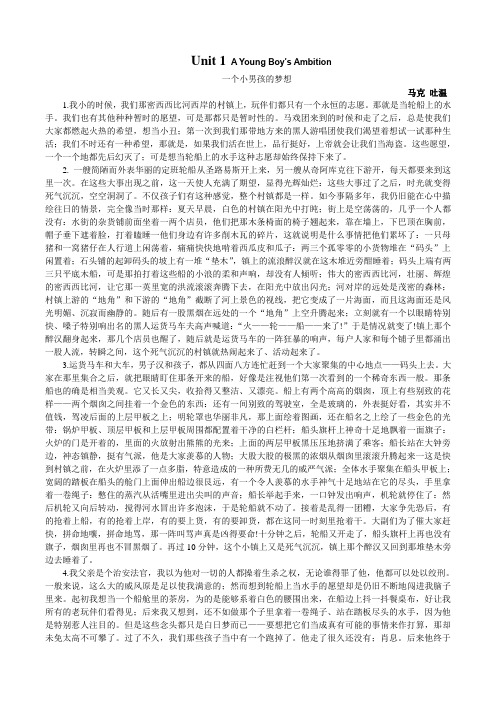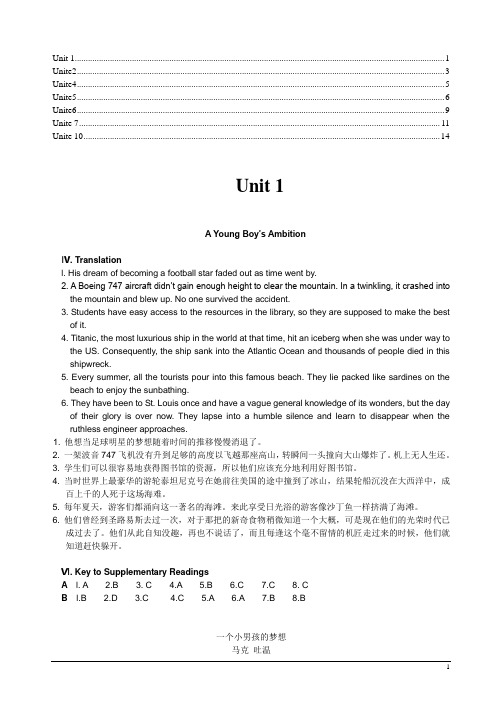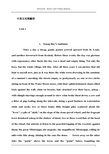The Boy's Ambition
公共英语课文翻译

Unit 1 A Young Boy’s Ambition一个小男孩的梦想马克吐温1.我小的时候,我们那密西西比河西岸的村镇上,玩伴们都只有一个永恒的志愿。
那就是当轮船上的水手。
我们也有其他种种暂时的愿望,可是那都只是暂时性的。
马戏团来到的时候和走了之后,总是使我们大家都燃起火热的希望,想当小丑;第一次到我们那带地方来的黑人游唱团使我们渴望着想试一试那种生活;我们不时还有一种希望,那就是,如果我们活在世上,品行挺好,上帝就会让我们当海盗。
这些愿望,一个一个地都先后幻灭了;可是想当轮船上的水手这种志愿却始终保持下来了。
2. 一艘简陋而外表华丽的定班轮船从圣路易斯开上来,另一艘从奇阿库克往下游开,每天都要来到这里一次。
在这些大事出现之前,这一天使人充满了期望,显得光辉灿烂:这些大事过了之后,时光就变得死气沉沉,空空洞洞了。
不仅孩子们有这种感觉,整个村镇都是一样。
如今事隔多年,我仍旧能在心中描绘往日的情景,完全像当时那样:夏天早晨,白色的村镇在阳光中打盹;街上是空荡荡的,几乎一个人都没有:水街的杂货铺前面坐着一两个店员,他们把那木条椅面的椅子翘起来,靠在墙上,下巴顶在胸前,帽子垂下遮着脸,打着瞌睡一他们身边有许多削木瓦的碎片,这就说明是什么事情把他们累坏了:一只母猪和一窝猪仔在人行道上闲荡着,痛痛快快地啃着西瓜皮和瓜子:两三个孤零零的小货物堆在“码头”上闲置着;石头铺的起卸码头的坡上有一堆“垫木”,镇上的流浪醉汉就在这木堆近旁酣睡着;码头上端有两三只平底木船,可是那拍打着这些船的小浪的柔和声响,却没有人倾听;伟大的密西西比河,壮丽、辉煌的密西西比河,让它那一英里宽的洪流滚滚奔腾下去,在阳光中放出闪光;河对岸的远处是茂密的森林;村镇上游的“地角”和下游的“地角”截断了河上景色的视线,把它变成了一片海面,而且这海面还是风光明媚、沉寂而幽静的。
随后有一股黑烟在远处的一个“地角”上空升腾起来;立刻就有一个以眼睛特别快、嗓子特别响出名的黑人运货马车夫高声喊道:“火——轮——船——来了!”于是情况就变了!镇上那个醉汉翻身起来,那几个店员也醒了,随后就是运货马车的一阵狂暴的响声,每户人家和每个铺子里都涌出一股人流,转瞬之间,这个死气沉沉的村镇就热闹起来了、活动起来了。
Unit 3 The art of painting 单词过关斩课件-高二英语选择性必修第一册

3. Even though I had admired them hundreds of times on my computer screen, nothing could have prepared me for the wonder I felt when I finally laid eyes on the real thing. 译文: _____ 我曾在电脑屏幕上无数次地欣赏过它们, 但当我最终看到真正的东 西时, _____________________________________。 4. It is尽am管azing that every time Monet studied this simple scene, he brought the p译o文nd:’s_b我_e_a所_u_t感y__t受o__t到h_e_的_c_a惊n_v_奇a_s_之_in_情_a_还u_n_是i_q_u让_e_我w_a_毫y_._无__准__备_______, 他都以一种独特的方式 把池塘的美带到了画布上。
(表示对比)而, 相对于 期待 漫步穿过 关注 给……留下印象 _在__过__去__三__十__年__里__ _更__喜__欢__做__某__事__ _靠__近__ _每__次__ _值__得__做__某__事__
Ⅲ. 必备句式: 翻译课文原句, 并观察黑体部分 1. As a huge art fan, I knew exactly what I was looking forward to most about my trip to Paris: visiting the Musée d’Orsay. 译文: 作为一个超级艺术迷, 我确切地知道我的巴黎之行 _最__期__待__的__是__什__么__: 参观 奥赛博物馆。 2. Housed in an old railway building, this world-famous art museum features some of the best-known paintings from the Impressionist movement of the 19th century. 译文: _这__座__举__世__闻__名__的__艺__术__博__物__馆__设__于__一__座__古__老__的__铁__路__建__筑__中__,_重__点__展__出__十九 世纪印象派运动中最著名的一些画作。
常见的几种英汉修辞对比_李芳元

常见的几种英汉修辞对比李芳元(岳阳师范学院大学英语教学部;湖南岳阳414006)摘 要:形象化的表达是以人们对有关事物的联想与对比为基础的。
不同的民族不同的社会环境与不同的文化教养会使人产生不同的联想,养成不同的事物比较习惯。
对英语和汉语的修辞手法进行对比可以发现其同中有异,异中有同。
关键词:常用修辞;英汉对比中图分类号:H311 文献标识码:A 文章编号:1006-6365(2001)04-0116-03 人们要准确、鲜明、生动地运用语言并充分发挥其作为交际工具的作用,必须学习和讲究修辞。
英语和汉语的修辞手法大多相同或近似,因此,对二者进行一些研究,作一些对比是有益的。
下面就十种常见的英汉修辞进行对比。
1.Simile(明喻)明喻就是把甲事物比作乙事物。
尽管甲乙两事物有很多不同之处,但在一定的对比含义上都有相同之点。
明喻由三个部分组成。
即:①本体,②喻体,③喻词。
常用的喻词有as,like,than和as if等。
例如:Rise,like lions after slu mber,In unvanguishable numberShake your chains to earth like dew,Which in sleep had fallen on you———You are many———they are few.(Shelly) (All of you,awakened slaves,rise to arms,break the chains, which had fallen on you in your sleep,and be confident of your vic-tory,for you are invincible in number.)象睡醒的雄狮一样站起来吧,你们的人数多得不可征服;抖掉你们身上的锁链,象抖掉沉睡时落在身上的霜露;你们是多数,他们是少数。
(雪莱)★my love's like a red,red rose.That's newly sprung in June;★my love's like the melody,That's s weetly played in tune.(How s weet and beautiful my love is!)爱人象六月初绽的玫瑰,爱人象和谐甜美的乐曲。
高二英语单词拼写练习试题集

高二英语单词拼写练习试题答案及解析1.My father did all the cooking in my mother’s ______________ (缺席,不在某处).【答案】absence【解析】句意:妈妈不在家时,都是爸爸做饭。
in sb’s absence表示“某人不在”。
2. If you do someone a______________ (喜爱,恩惠) , you do something for them even though you do not have to.【答案】favour【解析】句意:如果你帮某人一个忙,你就为他们做点什么,尽管你不必这样做。
do sb a favour帮某人一个忙。
3. She is proud that both her children have a______________ (天才,特殊能力;才干) for music.【答案】talent【解析】句意:她很自豪自己的两个孩子都有音乐天赋。
have a talent for表示“在某方面有天赋”。
4. He would not have got injured if he had ______________ (服从,顺从) the traffic rule.【答案】obeyed【解析】句意:要是遵守交通规则的话,我们就不会受伤了。
obey the rule遵守规则。
5. One of his a_________ is to become a pilot.【答案】ambitions【解析】考查名词。
句意:他的理想之一就是成为一名飞行员。
One of句型中名词用复数,指“…之一”,故填ambitions.6.【1】The living people in these apartments have free a_________________ to that swimming pool.(进入,通路).【答案】access【解析】access考查名词。
新世纪研究生公共英语教材阅读A答案+课文翻译

Unit 1 (1)Unite2 (3)Unite4 (5)Unite5 (6)Unite6 (9)Unite 7 (11)Unite 10 (14)Unit 1A Young Boy’s AmbitionⅣ. Translationl. His dream of becoming a football star faded out as time went by.2. A Boeing 747 aircraft didn’t gain enough height to clear the mountain. In a twinkling, it crashed intothe mountain and blew up. No one survived the accident.3. Students have easy access to the resources in the library, so they are supposed to make the bestof it.4. Titanic, the most luxurious ship in the world at that time, hit an iceberg when she was under way tothe US. Consequently, the ship sank into the Atlantic Ocean and thousands of people died in this shipwreck.5. Every summer, all the tourists pour into this famous beach. They lie packed like sardines on thebeach to enjoy the sunbathing.6. They have been to St. Louis once and have a vague general knowledge of its wonders, but the dayof their glory is over now. They lapse into a humble silence and learn to disappear when the ruthless engineer approaches.1. 他想当足球明星的梦想随着时间的推移慢慢消退了。
新世纪英语课后答案(1)

阅读考试题型1. 翻译英译汉5句,共20分(课文)汉译英5句,共20分(课后)2. 选词填空20句,共20分(课后)3. 完型填空20空,共20分(课后)4. 作文20分注,考试时间十七周周一早8:00,地点另行通知。
考试地点2103Unit 1A Young Boy’s AmbitionV ocabulary Study:1.permanent2.had assembled3.discharging4.meekly5.apprentice6.partiality7.obscure8.exalted9.intruding 10.cordially 11.ambition 12.gallantlyCLOZE:BDCAB ADABB DBDAA CCDCB、Ⅳ. Translation1.他想当足球明星的梦想随着时间的推移慢慢消退了。
His dream of becoming a football star faded out as time went by.2.一架波音747飞机没有升到足够的高度以飞越那座高山,转瞬间一头撞向大山爆炸了。
机上无人生还。
A Boeing 747 aircraft didn’t gain enough height to clear the mountain. In a twinkling, it crashed into the mountain and blew up. No one survived the accident.3.学生们可以很容易地获得图书馆的资源,所以他们应该充分地利用好图书馆。
Students have easy access to the resources in the library, so they are supposed to make the best of it.4.当时世界上最豪华的游轮泰坦尼克号在她前往美国的途中撞到了冰山,结果轮船沉没在大西洋中,成百上千的人死于这场海难。
英语课文中英文对照翻译1-7

中英文对照翻译Unit 1A Y oung Boy‟s AmbitionOnce a day a cheap, gaudy packet arrived upward from St. Louis, and another downward from Keokuk. Before these events, the day was glorious with expectancy; after them, the day was a dead and empty thing. Not only the boys, but the whole village, felt this. After all these years I can picture that old time to myself now, just as it was then: the white town drowsing in the sunshine of a summer's morning; the streets empty, or prettynearly so; one or two clerks sitting in front of the Water Street stores, with their splint-bottomed chairs tilted back against the wall, chins on breasts, hats slouched over their faces, asleep - with shingle-shavings enough around to show what broke them down; a sow and a litter of pigs loafing along the sidewalk, doing a good business in watermelon rinds and seeds; two or three lonely little freight piles scattered about the "levee"; a pile of "skids" on the slope of the stone-paved wharf, and the fragrant town drunkard asleep in the shadow of them; two or three wood flats at the head of the wharf, but nobody to listen to the peaceful lapping of the wavelets against them; the great Mississippi, the majestic, the magnificent Mississippi, rolling its mile-wide tide along, shining in the sun; the dense forest away on the other side; the "point" above the town, and the "point" below, bounding theriver-glimpse and turning it into a sort of sea, and withal a very still and brilliant and lonely one. Presently a film of dark smoke appears above one of those remote "points"; instantly a negro drayman, famous for his quick eye and prodigious voice, lifts up the cry, "S-t-e-a-m-boat a-comin!" and the scene changes! The town drunkard stirs, the clerks wake up, a furious clatter of drays follows, every house and store pours out a human contribution, and all in a twinkling the dead town is alive and moving.一艘简陋而外表华丽的定班轮船从圣路易斯开上来,另一艘从奇阿库克往下游开,每天都要来到这里一次。
unit 1 The Boys' Ambition

figurative language
• Besides, he resorts to figurative language, such as simile and personification which adds freshness and life to his description. • For example, he depicts "the white town drowsing in the sunshine" (para. 2) by employing personification; • he draws a picture of "the boats that lay packed together like sardines" by using simile (para. 6).
Байду номын сангаас
Permanent/transient ambition
Describe the scene before the steambaot came and the water-street clerk.
Conclusion
• In a word, Mark Twain makes his narration and description attractive to the readers with his marvelous writing techniques. • Perhaps, the story reminds you of your own ambition either transient or permanent in your life. • By writing a narrative like this essay, you can recollect your ambitions both at present and in the past.
- 1、下载文档前请自行甄别文档内容的完整性,平台不提供额外的编辑、内容补充、找答案等附加服务。
- 2、"仅部分预览"的文档,不可在线预览部分如存在完整性等问题,可反馈申请退款(可完整预览的文档不适用该条件!)。
- 3、如文档侵犯您的权益,请联系客服反馈,我们会尽快为您处理(人工客服工作时间:9:00-18:30)。
Life on the MississippiBy Mark TwainChapter 4 The Boys' AmbitionWHEN I was a boy, there was but one permanent ambition among my comrades in our village on the west bank of the Mississippi River. That was, to be a steamboatman. We had transient ambitions of other sorts, but they were only transient. When a circus came and went, it left us all burning to become clowns; the first negro minstrel show that came to our section left us all suffering to try that kind of life; now and then we had a hope that if we lived and were good, God would permit us to be pirates. These ambitions faded out, each in its turn; but the ambition to be a steamboatman always remained.Once a day a cheap, gaudy packet arrived upward from St. Louis, and another downward from Keokuk. Before these events, the day was glorious with expectancy; after them, the day was a dead and empty thing. Not only the boys, but the whole village, felt this. After all these years I can picture that old time to myself now, just as it was then: the white town drowsing in the sunshine of a summer's morning; the streets empty, or pretty nearly so; one or two clerks sitting in front of the Water Street stores, with their splint-bottomed chairs tilted back against the wall, chins on breasts, hats slouched over their faces, asleep--with shingle-shavings enough around to show what broke them down; a sow and a litter of pigs loafing along the sidewalk, doing a good business in watermelon rinds and seeds; two or three lonely little freight piles scattered about the 'levee;' a pile of 'skids' on the slope of the stone-paved wharf, and the fragrant town drunkard asleep in the shadow of them; two or three wood flats at the head of the wharf, but nobody to listen to the peaceful lapping of the wavelets against them; the great Mississippi, the majestic, the magnificent Mississippi, rolling its mile-wide tide along, shining in the sun; the dense forest away on the other side; the 'point' above the town, and the 'point' below, bounding the river-glimpse and turning it into a sort of sea, and withal a very still and brilliant and lonely one. Presently a film of dark smoke appears above one of those remote 'points;' instantly a negro drayman, famous for his quick eye and prodigious voice, lifts upthe cry, 'S-t-e-a-m-boat a-comin'!' and the scene changes! The town drunkard stirs, the clerks wake up, a furious clatter of drays follows, every house and store pours out a human contribution, and all in a twinkling the dead town is alive and moving. Drays, carts, men, boys, all go hurrying from many quarters to a common center, the wharf. Assembled there, the people fasten their eyes upon the coming boat as upon a wonder they are seeing for the first time. And the boat IS rather a handsome sight, too. She is long and sharp and trim and pretty; she has two tall, fancy-topped chimneys, with a gilded device of some kind swung between them; a fanciful pilot-house, a glass and 'gingerbread', perched on top of the 'Texas' deck behind them; the paddle-boxes are gorgeous with a picture or with gilded rays above the boat's name; the boiler deck, the hurricane deck, and the Texas deck are fenced and ornamented with clean white railings; there is a flag gallantly flying from the jack-staff; the furnace doors are open and the fires glaring bravely; the upper decks are black with passengers; the captain stands by the big bell, calm, imposing, the envy of all; great volumes of the blackest smoke are rolling and tumbling out of the chimneys--a husbanded grandeur created with a bit of pitch pine just before arriving at a town; the crew are grouped on the forecastle; the broad stage is run far out over the port bow, and an envied deckhand stands picturesquely on the end of it with a coil of rope in his hand; the pent steam is screaming through the gauge-cocks, the captain lifts his hand, a bell rings, the wheels stop; then they turn back, churning the water to foam, and the steamer is at rest. Then such a scramble as there is to get aboard, and to get ashore, and to take in freight and to discharge freight, all at one and the same time; and such a yelling and cursing as the mates facilitate it all with! Ten minutes later the steamer is under way again, with no flagon the jack-staff and no black smoke issuing from the chimneys. After ten more minutes the town is dead again, and the town drunkard asleep by the skids once more.My father was a justice of the peace, and I supposed he possessed the power of life and death over all men and could hang anybody that offended him. This was distinction enough for me as a general thing; but the desire to be a steamboatman kept intruding, nevertheless. I first wanted to be a cabin-boy, so that I could come out with a white apron on and shake a tablecloth over the side, where all my old comrades could see me; later I thought I would rather be the deckhand who stood on the end of the stage-plank with the coil of rope in his hand, because he was particularly conspicuous. But these were only day-dreams,--they were too heavenly to becontemplated as real possibilities. By and by one of our boys went away. He was not heard of for a long time. At last he turned up as apprentice engineer or 'striker' on a steamboat. This thing shook the bottom out of all my Sunday-school teachings. That boy had been notoriously worldly, and I just the reverse; yet he was exalted to this eminence, and I left in obscurity and misery. There was nothing generous about this fellow in his greatness. He would always manage to have a rusty bolt to scrub while his boat tarried at our town, and he would sit on the inside guard and scrub it, where we could all see him and envy him and loathe him. And whenever his boat was laid up he would come home and swell around the town in his blackest and greasiest clothes, so that nobody could help remembering that he was a steamboatman; and he used all sorts of steamboat technicalities in his talk, as if he were so used to them that he forgot common people could not understand them. He would speak of the 'labboard' side of a horse in an easy, natural way that would make one wish he was dead. And he was always talking about 'St. Looy' like an old citizen; he would refer casually to occasions when he 'was coming down Fourth Street,' or when he was 'passing by the Planter's House,' or when there was a fire and he took a turn on the brakes of 'the old Big Missouri;' and then he would go on and lie about how many towns the size of ours were burned down there that day. Two or three of the boys had long been persons of consideration among us because they had been to St. Louis once and had a vague general knowledge of its wonders, but the day of their glory was over now. They lapsed into a humble silence, and learned to disappear when the ruthless 'cub'-engineer approached. This fellow had money, too, and hair oil. Also an ignorant silver watch and a showy brass watch chain. He wore a leather belt and used no suspenders. If ever a youth was cordially admired and hated by his comrades, this one was. No girl could withstand his charms. He 'cut out' every boy in the village. When his boat blew up at last, it diffused a tranquil contentment among us such as we had not known for months. But when he came home the next week, alive, renowned, and appeared in church all battered up and bandaged, a shining hero, stared at and wondered over by everybody, it seemed to us that the partiality of Providence for an undeserving reptile had reached a point where it was open to criticism.This creature's career could produce but one result, and it speedily followed. Boy after boy managed to get on the river. The minister's son became an engineer. The doctor's and the post-master's sons became 'mud clerks;' the wholesale liquor dealer's son became a barkeeper on a boat; four sons of the chief merchant, and twosons of the county judge, became pilots. Pilot was the grandest position of all. The pilot, even in those days of trivial wages, had a princely salary--from a hundred and fifty to two hundred and fifty dollars a month, and no board to pay. Two months of his wages would pay a preacher's salary for a year. Now some of us were left disconsolate. We could not get on the river--at least our parents would not let us.So by and by I ran away. I said I never would come home again till I was a plot and could come in glory. But somehow I could not manage it. I went meekly aboard a few of the boats that lay packed together like sardines at the long St. Louis wharf, and very humbly inquired for the pilots, but got only a cold shoulder and short words from mates and clerks. I had to make the best of this sort of treatment for the time being, but I had comforting daydreams of a future when I should be a great and honored pilot, with plenty of money, and could kill some of these mates and clerks and pay for them.马克·吐温是美国批判现实主义文学的奠基人,世界著名的短篇小说大师。
